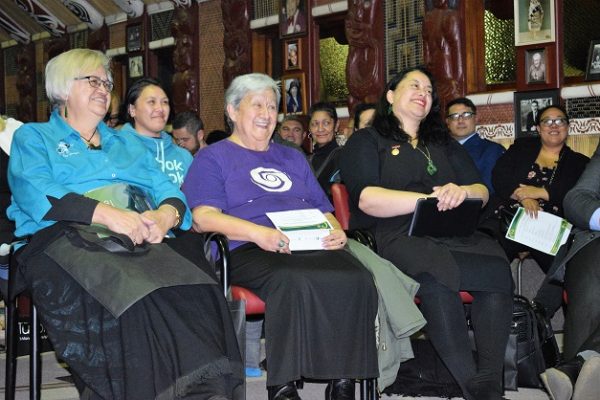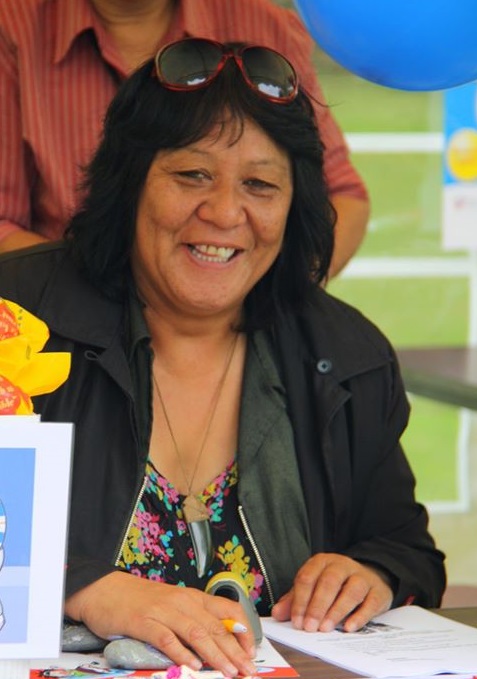For over a decade, the E Tū Whānau movement has been sharing ideas and building alliances with like-minded whānau, hapū and iwi as we all work towards a shared vision − an Aotearoa where ‘whānau are strong, safe and prosperous; living with a clear sense of identity and cultural integrity, and with control over their destiny. Te mana kaha o te whānau!’
 The recent launch of Tū Pono: Te Mana Kaha ō te Whānau, at Christchurch’s Rehua Marae, is a tangible example of how that vision is getting a little closer to reality.
The recent launch of Tū Pono: Te Mana Kaha ō te Whānau, at Christchurch’s Rehua Marae, is a tangible example of how that vision is getting a little closer to reality.
Strategy to reduce violence
Tū Pono is a Ngāi Tahu-led strategy to reduce the impact that family violence is having on families and communities throughout Te Waipounamu and Aotearoa.
It developed out of a series of community and whānau consultations lead by Tā Mark Solomon, then Kaiwhakahaere of Te Rūnanga o Ngāi Tahu and Helen Leahy of Te Pūtahitanga o Te Waipounamu, the Whānau Ora Commissioning Agency. The aim was to start meaningful conversations about how the people of Te Waipounamu deal with the problems of whānau violence in a Ngāi Tahu way.
Whānau champions
 Tania Mataki, a member of the E Tū Whānau Māori Leadership Group and Practice Manager at Te Puna Oranga in Ōtautahi, took part in the marae by marae consultations and the round of hui.
Tania Mataki, a member of the E Tū Whānau Māori Leadership Group and Practice Manager at Te Puna Oranga in Ōtautahi, took part in the marae by marae consultations and the round of hui.
“E Tū Whānau’s support enabled us to take whānau champions with us − rangatahi, pākeke, kuia and kaumātua – as we travelled from urban areas to often quite isolated rural areas.”
“We acknowledged the hurt suffered by many, and heard what those whānau wanted to tell us about their experience of change and transformation.”
Tania’s mother, the highly respected kuia, Whaea Kiwa Hutchens was a valued part of the consultation hikoi.
“Mum and I shared a case of abuse in our own family and talked about the way we addressed the situation collectively. It’s not an easy thing for any family to deal with but we talked about the importance of being open, holding the whānau member who committed this abuse responsible for his actions and finding ways, as a family, to acknowledge the hurt, to heal, change and transform.”
Nurture relationships
At the hui people talked about whānau violence resulting from the misuse of alcohol and drugs, but they also talked about the loss of language, the loss of connection and the need to nurture relationships and build on them.
Tania said it was noticeable how often women talked about their children or menfolk, but not about themselves.
“We had to ask them to talk more about their own experience and what they needed for themselves.“
One thing that became clear from the overall feedback was that whānau believed in themselves, says Tania. “They felt that they had the solutions to their own problems but they were also asking for support.”
“They wanted help to highlight the value of relationships within Te Ao Māori in simple, easy to understand ways. They also wanted practical ideas for using the knowledge they already have to safely support whānau affected by sexual or domestic violence.”
Time to stand up
A simply written booklet with ideas on how a whole community can act together to support whānau who’ve disclosed sexual violence and to prevent further abuse is being developed. It’s an immediate response, but the Tū Pono strategy is a blueprint for much more.
As Dame Tariana Turia said at the launch of Tū Pono, “We must all hold hands together and take our whānau, particularly our tamariki, to that special place our tūpuna prepared for us.
“We are born of greatness. Let us live it with pride and strength. While we may acknowledge trauma and reasons for these dreadful statistics of family violence, we must also stand up and say there is no excuse.”
